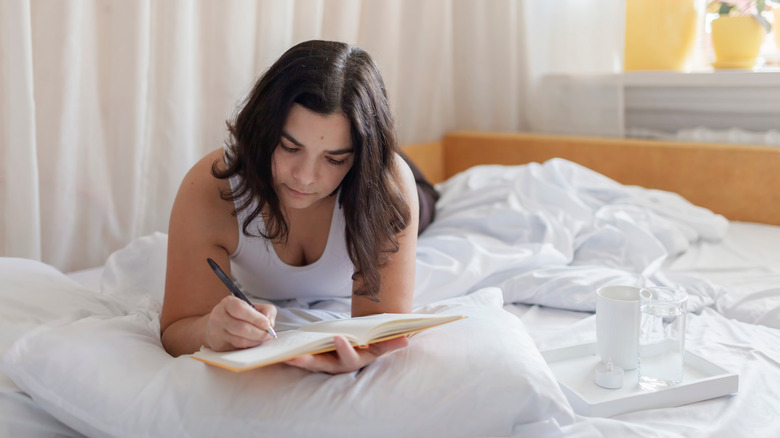Morning Pages Are The Daily Habit That Can Jumpstart Your Creativity
When you first wake up, just after shutting off your alarm and before sipping your morning coffee, how do you feel? You might be a bit groggy and even grouchy, but chances are you're also in a peaceful state before the chaos of the day begins. This is because your brain produces alpha waves soon after waking up. According to Healthline, alpha brain waves bridge the gap between theta waves (produced during light sleep) and beta waves (which occur when you're wide awake and going about your day).
This in-between stage is unique, similar to brain activity during meditation, and considered one of the ripest times for creativity. Think about it: In the first moments of the day, you're not yet focused on your to-do list, nor are you alert enough to start monitoring your own thoughts and feelings. Instead, you might be reflecting on a dream you had before your alarm went off or the physical sensation as you rose from the bed.
You're simply existing in your natural state without any self-consciousness or judgment, making those early morning hours perfect for sparking creativity. To take advantage of this relaxed, artistic period, you don't have to start painting in bed or composing music while still wrapped up in a comforter. Instead, Julia Cameron, author of "The Artist's Way," suggests grabbing a notebook and jotting down some "morning pages."
What are morning pages?
"Morning pages" — just as the name suggests — are journal pages written in the morning. Julia Cameron, known as "The Godmother" of creativity, first introduced the exercise in the 1990s, which has since attracted famous fans (including productivity expert Tim Ferriss and singer Alicia Keys) and gone viral on platforms like TikTok.
Cameron explains on her website that the practice involves writing three full pages longhand (no typing allowed!) at the very beginning of each day. Write whatever comes to mind, without worrying about how the words sound or even if the grammar makes sense. Cameron urges, "Do not over-think Morning Pages: Just put three pages of anything on the page ... and then do three more pages tomorrow."
It's also crucial to not share the pages with anyone else. They should be kept private so that you feel comfortable writing freely, without fear of judgment. And remember, you must do three pages — no more and no less. "Ordinarily, the first page and a half [are] pretty easy," Cameron acknowledged. "The second page and a half [are] more difficult, but it moves us into action. More than three pages invite self-obsession."
How morning pages boost creativity
Jotting down three pages of anything-goes, stream-of-consciousness writing might seem too simple to offer any real benefits, but proponents claim that the daily habit is truly life-changing. Julia Cameron herself swears by the practice, noting that the topics you choose to write about may "seem to have nothing to do with creativity, but what they do is clear your mind." Thus, morning pages could be enough to help you overcome writer's block or brain fog during a work meeting, for example.
Cameron also confirmed that it's okay to write down any negative thoughts, especially if you tend to wake up feeling a bit grumpy. Jotting down these thoughts helps to release your complaints and worries, which could be potential roadblocks to creativity, even if you don't realize it. A 2005 research article published in Advances in Psychiatric Treatment confirms the psychological benefits of journaling.
These include but are not limited to; improved working memory, better mood (an essential ingredient for creative thinking, according to Ted), and even a change in vocabulary and communication style. Whether you're planning to write a best-selling novel, paint the next museum-worthy masterpiece, or just figure out how to tackle everyday problems at work, a few journal pages every morning may help you get there.


